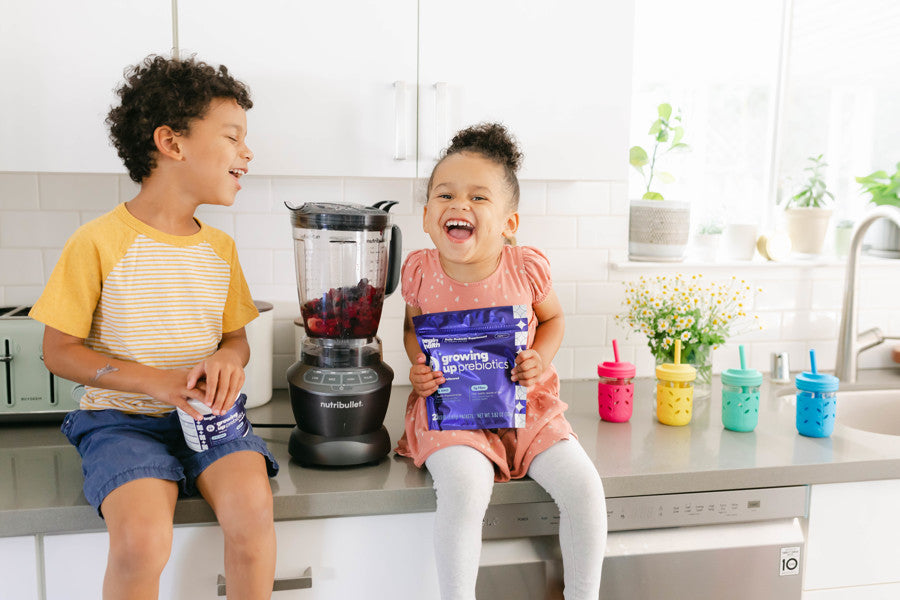Your Cart is Empty
Continue shoppingVitamin C and Kids Gut Health: What Parents Need to Know
Medically Reviewed by May Zhu, RDN | Published November 23, 2023
share this article

Vitamin C is commonly known in the nutrition world as a nutrient for immune support, but it can also have a crucial role in supporting gut health in kids as well. The gut microbiome has an important role in a kid’s development and can influence their risk for developing chronic diseases later in life [1]. Our kiddos experience rapid cognitive, physical, and social growth between the ages of one and six, therefore a nutrient-rich diet that includes Vitamin C can help set the foundation for both good gut health now and later in life [2]. In this blog, we'll review the connection between the role of Vitamin C and gut health and what parents need to know to set their kids up for a lifetime of health.
Vitamin C and Immunity
Vitamin C, also known as ascorbic acid, is known for its immune supporting properties. It's a vital nutrient that supports a kid’s overall health by also helping in the absorption of iron and promoting healthy skin. But there's an aspect of vitamin C that often doesn't get the attention it deserves - its role in gut health.
Connection between Gut Health and Vitamin C
The gut, often referred to as the "second brain," is a complex ecosystem of trillions of microorganisms, including bacteria, that play a role in digestive health, immunity, and even mood [3]. A balanced and diverse gut microbiome is essential for a kid’s health because it can influence everything from digestion to their immune system's effectiveness. Studies have found that inadequate Vitamin C intake in kids led to a great risk for intestinal inflammation [4]. Low Vitamin C intake is also linked to an increased risk for constipation [10].
Research Behind Vitamin C Benefits for Gut Health
Healthy Digestion: Vitamin C helps the body produce digestive enzymes that break down food and support better nutrient absorption [5]. Both iron and calcium absorb better in the body with an adequate Vitamin C intake [6].
Promotes Gastric Motility: Vitamin C supports gastric motility, which is the movement of foods through the digestive tract [8].
Gut Microbiome Balance: Studies find that Vitamin C improves total count of Bifidobacteria in the gut, which can promote a balanced gut microbiome for healthier digestion [7]. Populating the gut with good bacteria helps the gut microbiota composition and is associated with anti-inflammatory effects
Maintains Gut Lining Integrity: Vitamin C aids in the formation of collagen, a protein essential for maintaining the integrity of the gut lining. This ensures that the gut remains strong and resistant to damage from inflammation [9].
Begin Health Expert Tip
Prebiotics can also help support your kiddo’s immunity by boosting good gut bacteria to promote a healthy digestion. Try mixing in a serving of Growing Up Prebiotics to your little one’s favorite Vitamin C-rich juice such as 100% orange juice or 100% grapefruit juice* for an extra fiber and immune boost. Every serving of Growing Up Prebiotics provides 3g of daily fiber that supports both digestive health and immunity.
*Opt for juices with no-added sugars to keep your little one’s added sugar intake to a minimum.
Daily reads to help your little ones lead happier and healthier lives.
Buy Now
Join the
Happy Gut Club
Vitamin C Sources for Kids
It's essential for our little ones to consume an adequate amount of vitamin C to support their immune system and gut health. As dietitians, we also recommend starting with whole food sources of nutrition first. Here are some kid-friendly sources of vitamin C:
Citrus Fruits: Oranges, grapefruits, and tangerines are packed with vitamin C and make for healthy snacks.
Strawberries: These berries are not only a delicious sweet treat but also a rich source of vitamin C.
Bell Peppers: Red, yellow, and green bell peppers are excellent choices. They can be sliced and included in salads or served with your little one’s favorite dip.
Kiwi: This small fruit is loaded with vitamin C and makes a great addition to fruit salads.
Broccoli: Kids may not always be fans of vegetables, but broccoli is a good source of vitamin C and can be prepared in various kid-friendly ways. Try roasting it to make it a fun crispy texture or blending it into soups.
Cantaloupe: Slices of cantaloupe are a refreshing and nutritious choice for a vitamin C boost.
Begin Health Expert Tip
Vitamin C is a water-soluble vitamin, which means that the body doesn’t store it. Instead, the body will only absorb what it needs at the moment and flush out the rest via urine. In order to ensure there’s adequate Vitamin C in the body, it’s best to consume Vitamin C rich foods daily to get the most benefits.
RDA for Vitamin C by Age Group + Examples of Vitamin C Content in Foods
|
Age Group |
Recommended Dietary Allowance (RDA) for Vitamin C |
Vitamin C Source + Percent Daily Intake Per Serving |
|---|---|---|
|
Infants (0-6 months) |
40 mg |
Breast milk or infant formula can provide sufficient Vitamin C for this age group |
|
Infants (7-12 months) |
50 mg |
¼ cup pureed strawberries, 40% RDA |
|
Toddlers (1-3 years) |
15 mg |
½ cup orange slices, 102% RDA |
|
Kids (4-8 years) |
25 mg |
1/4 cup red bell pepper slices, 119% RDA |
|
Kids (9-13 years) |
45 mg |
½ kiwi, 102% RDA |
Summary
Ensuring your kid’s gut health is a crucial aspect of their overall well-being. A balanced diet rich in vitamin C can help your little ones maintain a balanced gut microbiome, boost good gut bacteria, absorb nutrients such as iron, and support their overall immune system. Food sources of Vitamin C include citrus fruits, berries, bell peppers, kiwis, broccoli, and cantaloupe.

Author
May Zhu, RDN
Trending

Why Parents Are Choosing Prebiotics Over Stool Softeners for Kids
read now
Inc. Names Begin Health to Its 2025 List of the Fastest-Growing Private Companies in the Midwest
read now
Oxalates and Kids' Digestion: How High-Oxalate Foods Contribute to Constipation and Gut Discomfort
read now






